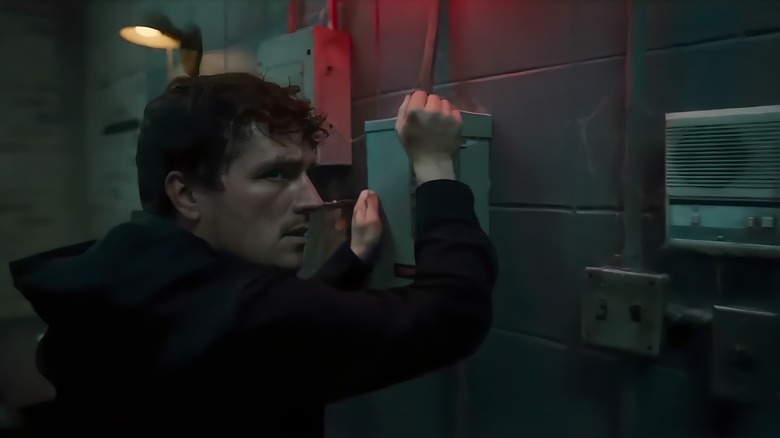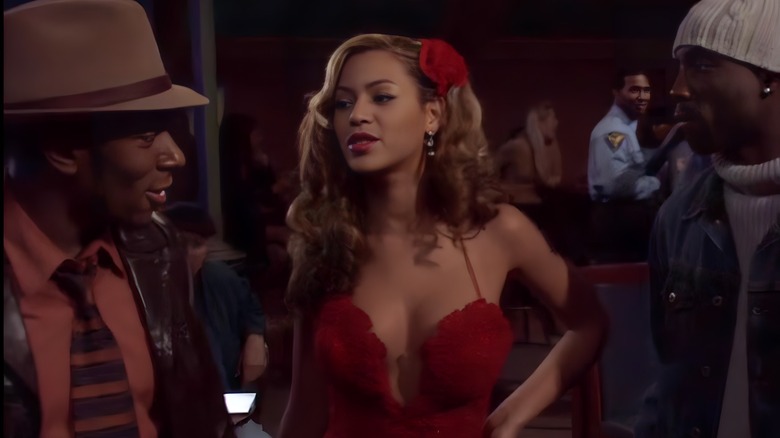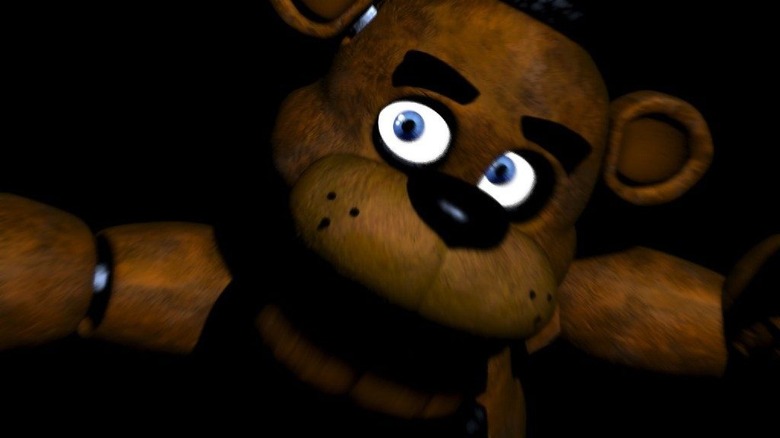Why Five Nights At Freddy's Features A Famous French Operatic Theme
If you're unfamiliar with the popular video game, it may have been a little jarring to suddenly hear the "Toreadors March" from the French opera "Carmen" blasting through the speakers of Freddy Fazbear's Pizza in the trailer for Universal and Blumhouse's film adaptation of "Five Nights at Freddy's." As seemingly random as the needle drop might seem to non-fans, this is actually a reference to the earliest non-original song played in the series. When the power goes out at night, a little music box-like rendition of the song is emitted from Freddy Fazbear's animatronic, turning the song into a terrifying omen of the dangers to come. The original game uses a sample from "1905 Regina Music Box: Classical Overture" from Hot Ideas Inc. The tune was the most used music box of the franchise and has become Freddy Fazbear's signature leitmotif.
While it's unknown how the "FNaF" movie will incorporate the song, the fact it's featured throughout the theatrical trailer seems to imply that the song will definitely be at the center of the score composed by The Newton Brothers. There was even a shot of Springtrap humming the tune while stalking around in the dark, which will most certainly evoke plenty of nightmares. But of all of the songs in the world to choose from, why does "Five Nights at Freddy's" feature a song from a nearly 150-year-old opera? Let's look at both the practical and theoretical reasons why this song found its way into the games (and movie), and why the piece is the perfect groundwork for Freddy's jingle.
The music of Carmen is extremely well-known
Even if a person can't name the title of the piece or who wrote the tune, most people could probably hum along to a piece or two from George Bizet's opera "Carmen," simply because the music has been reappropriated for over a century in different forms. The opera is in the public domain because Bizet died in 1875, and the term of protection has long since expired. However, certain productions of the opera, like Francesco Rosi's 1984 film version, contain copyrights, performer rights, and producer rights. Meaning, the sheet music of "Carmen" can be used and interpreted however anyone wants, but if you want an existing recording, you'll have to pay for it.
This has led to the music being used in countless commercials, TV shows, movies, and yes, even video games. The song "Habanera" has arguably been used the most, and you may recognize the string movement as sung by The Muppets (and Elmo on "Sesame Street"), the song that plays as Carl stumbles throughout his home in "Up," or how the rushing opening of the piece is used as the theme song for Tyson chicken commercials. Both "The Simpsons" and "Hey Arnold!" feature episodes of the cast seeing productions of the show, and Queen Bey herself, Beyoncé, made her acting debut in Robert Townsend's "Carmen: A Hip Hopera."
This makes the use of the "Toreadors March" in "Five Nights at Freddy's" such a great choice. The game doesn't have to pay expensive royalties to obtain the rights to the song, the general public is already familiar with the tune even if they don't know it by name, and it doesn't fall under the umbrella of nursery rhymes or folk songs — which have been done to death in horror movies by now.
The meaning of the Toreadors March in Five Nights at Freddy's
While the song's official name is "Votre toast, je peux vous le rendre" ("I toast you"), it's colloquially known as the "Toreadors March." Not only is the use of the aria smart from a practical perspective, but it's also a weirdly fitting tune given the lore of the game. The song is sung by the bullfighter Escamillo in "Carmen" (that's what toréador means), and he's singing about his experiences facing down bulls and the fame that comes with every victory, but also that his job is a literal fight for his life, every single time.
Check out a section of the lyrics: "Yes, contemplate as you fight / That a dark eye is watching you." This could absolutely also describe the relationship between security guard Mike Schmidt and Freddy Fazbear. Mike is a bullfighter facing down a dangerous, powerful creature that looks unassuming but could absolutely kill him. It's an appropriate song given its triumphant sound, but when played through a childlike music box, becomes extremely creepy.
Canonically speaking, the song emitted by Freddy Fazbear was installed as a means to provide comfort to children if the power ever went out in Freddy Fazbear's Pizzeria. With that in mind, the song starts to take an even more twisted turn. The "Toreadors March" is ultimately a victory song, so an animatronic bear meant to comfort suddenly playing a song about successfully defeating an enemy while children are likely terrified is a little messed up. It's almost as if he's taunting the listener, reminding them that he will always be the victor. Then again, this is a series about the souls (and sometimes bodies) of dead kids being shoved into animatronics, so this is hardly the weirdest thing in the franchise.
"Five Nights at Freddy's" hits theaters and arrives on Peacock on October 27, 2023.


